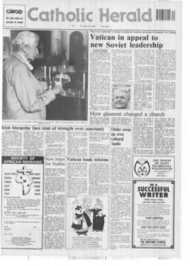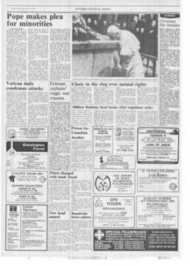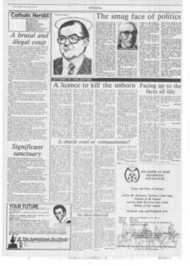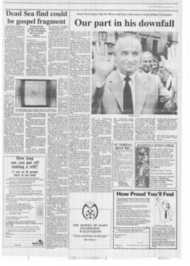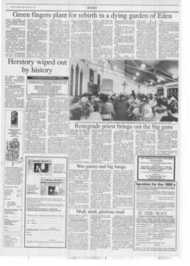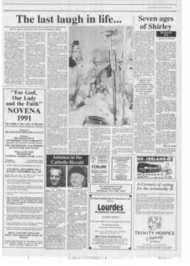Page 7, 23rd August 1991
Page 7
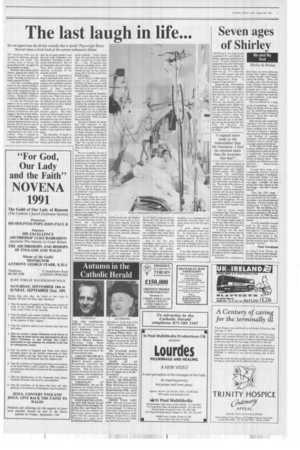
Report an error
Noticed an error on this page?If you've noticed an error in this article please click here to report it.
Tags
Share
Related articles
Off The Mark
Making Tracks On The Path Pilgrims' Way To Canterbury
Gifts Of The Spirit Shared By Saints
Recent Paperbacks
Christianity Becomes Relevant In One Second Of Film
Seven ages of Shirley
Me and My God Shirley du Boulay
"ACTUALLY, I've done myself a spiritual CV," said Shirley du Boulay, glancing apprehensively at me. "I never realised how connected it was, but I don't quite know at which end to start." She paused to turn her thoughts the right way up. "I've done this before to other people," she said, the sentence trailing off into a self-deprecatory laugh. "I suppose I'll get used to it."
Indeed she has. When Shirley du Boulay worked in the religious affairs department at the BBC, interviewing other people about their faith was a necessary part of the job. ("How long were you there for?" I asked her. "Forever," she riposted, with the sharp, brightly aware, slightly tart responsiveness that marks her: in fact, she stayed for 24 years.) This was after attending the Royal College of Music, where she studied the piano and violin. It was while she was at the BBC that she met her husband, the late John FX Harriott, the prodigiously gifted "Periscope" of the Tablet.
'I respond more easily to the transcendent than the immanent: I find the mystical easier than the incarnate. Got that?'
She was the best prepared of interviewees, with her carefullygarnered notes and slightly tentative manner like a slightly flustered don unwillingly dragooned into lecturing during rag week and had thought long and hard before agreeing to see me. The results of her process of reflection were, I thought, substantial scarcely surprising in someone who has just completed a new biography of St Teresa of Avila (shortly to be published by Hodder and Stoughton). We sat peacefully amidst the tranquil order of her Oxford garden and discussed them.
"They're seven stages according to this," she began, and broke off, reflexively. "I've never thought of this before."
The inexpert auditor ought to do no more than follow her trail, which falls, like Shakespeare's ages of man, into seven parts.
It begins with the early separation of her parents, and her present-day devotion to Jung. "I think that if the two great archetypes are separated, then one tries to find something in the middle. It somehow became mixed up with an idea of God, of One, of something unchanging in the midst of all the conflict going on in my life."
Prepared for confirmation three times, she twice pulled out,. feeling "that I didn't t.nderstand or believe enough" before finally taking the plunge. These, her . teenage years, saw the second stage, during which she had several "of those experiences that pinpoint one's life. I had a particularly strong experience of...well, I suppose one could call it nature mysticism. I was about 15 when that happened."
This was followed by "a long period of wandering". And yet, Shirley du Boulay told me, there was "an underlying magnetism there always...a sort of hound of heaven." Even then, she felt drawn to Catholicism.
What was the pull, I asked her? "Mystery," she shot back with that characteristic briskness, before mulling over the word. "The sort of mystery, I suppose, that you get in Orthodox churches ...the feeling of another dimension. And the feeling that • Catholics were so certain they , were right actually attracted me."
In this light, the fourth stage seems an unlikely one, though it is perhaps less so when the period is considered: transcendental meditation. "It was pre-13eatles," Shirley du Boulay noted. "And meditation was first known as the .
Spiritual Regeneration Movement."
It must have come as a considerable shock to find the attractive elements of meditation. "I discovered Chapter 7 of The Cloud of Unknowing, and I was very angry. I thought: 'all these. priests have been sitting on this knowledge why didn't anyone tell me?'"
Thus the fifth stage discovering Christian mysticism was succeeded by the sixth , becoming a non-denominational Christian. Of this attempt she simply says: "it doesn't work, does it?" She was thinldng (or I think she was thinking) of the need for community on the lonely road to God. In 1989 she was received into the Roman Catholic church.
A swift, beautifully-formed coda to the seven stages, delivered with another of those keen glances: "I'm theocentric rather than Christocentric; I respond more easily to the transcendent than the immanent; I find the mystical easier than the incarnate." Got that?
Paul Goodman
An extract from Shirley du Boulay's Teresa of Avila (Hodder £14.95) will be featured in the Catholic Herald next month.
blog comments powered by Disqus


